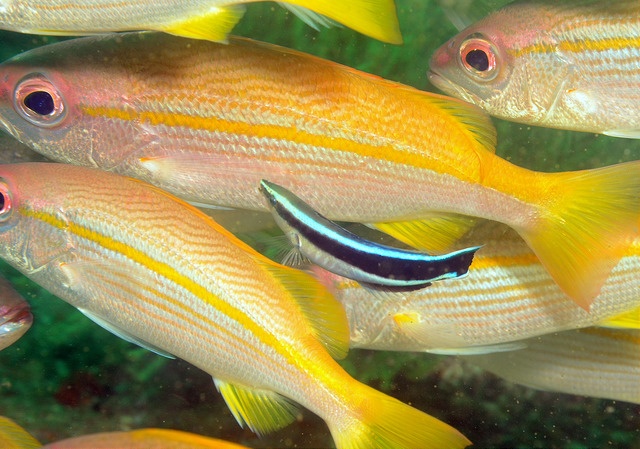Cheating cleaner wrasse cares about its reputation
In some circumstances, cleaner wrasse attract clients by presenting themselves as more friendly than they really are – and subsequently provide them a bad service, as research by Sandra Binning and colleagues reveals.
Anyone who runs a business should care about a good reputation, and the bluestreak cleaner wrasse, Labroides dimidiatus, definitely does. These fish try hard to be seen as cooperative partners, especially when they are exploitative partners in reality; in the words of Sandra Binning and colleagues, they have reputation management abilities.
The cleaner fish occupy a cleaning station on a reef and offer a cleaning service to other fish: the cleaners eat ectoparasites off the surface of their clients. It is a flourishing business, with cleaners on average being involved in two thousand interactions a day with more than a hundred clients; some clients come for inspection many times a day. Both partners benefit from the interactions – clients are cleaned, cleaners earn a meal – so, they have a mutualistic relationship. But a cleaner may cheat its client by taking a bite from its mucus, a layer that protects against abrasions or ultraviolet radiation, instead of removing parasites. A cleaner prefers eating the mucus over parasites, as it is more nutritious.
Temptation
Mostly, cleaners provide honest services. They just have to, because if they bite a client, that client will either leave and visit another cleaning station or chase the cleaner away from its station, making it impossible to continue its work for a while; and some clients are predatory fish that may ingest a cheating cleaner. Also, there are bystanders, waiting clients or potential clients, that eavesdrop on ongoing interactions and that notice when a cleaner bites its current client, as that client will involuntary make a short jolt in response. For the audience, the occurrence of a jolt is a reason to avoid that cleaner.
So, most cleaners behave in a decent manner. They will not bite, especially not when other fish are witnessing. Still, some cleaner wrasse sometimes behave badly, mainly females in the spawning season, when their energy demands are high and, accordingly, the temptation to cheat is high.
Friendly
As biting cleaners run a risk to lose their clients, they care about their reputation: they behave friendly towards small clients and provide these clients tactile stimulation by hovering above them and touching them with their pelvis fins.
Clients like this stimulation; it reduces their stress. Cooperative cleaners use to perform this behaviour infrequently to persuade a client to have itself inspected and cleaned, or to reconcile after a bite and prevent the client from fleeing or becoming aggressive, or to appease predatory fish. It is costly behaviour, because cleaners cannot eat while stroking a client.
But a biting cleaner that titillates a small client, does so for another reason, as the researchers found out before. Small clients offer less parasites and less mucus than larger clients. To stimulate them in order to keep friends with them would hardly be worth the effort, and in most cases it is unnecessary. Instead, the service of a cheater towards small clients is meant to attract larger observing clients, by showing them how friendly it behaves. When a large potential client sees the high service quality that the small client receives and approaches to be cleaned, the cheater can take a big bite of that large client’s mucus.
Witnesses
Now, the researchers show that biting cleaners only perform their hypocritical behaviour when it pays, that is: when many clients and many competing cleaners are around to witness. In such circumstances, cheaters often stroke small clients and bite the large clients that are misled by this nice behaviour. But when just a few clients and a few competitors are around, they will bite their small clients as well. They may be friendly, but only when an audience is looking.
Willy van Strien
Photo: Bluestreak wrasse, Labriodes dimidiatus, and clients. Keith Wilson (via Flickr, Creative Commons CC BY-NC 2.0)
Sources:
Binning, S.A., O. Rey, S, Wismer, Z. Triki., G. Glauser, M. C. Soares & R. Bshary, 2017. Reputation management promotes strategic adjustment of service quality in cleaner wrasse. Scientific Reports 7: 8425. Doi: 10.1038/s41598-017-07128-5
Pinto, A., J. Oates, A. Grutter & R. Bshary, 2011. Cleaner wrasses Labroides dimidiatus are more cooperative in the presence of an audience. Current Biology 21: 1140-1144. Doi: 10.1016/j.cub.2011.05.021
Bshary, R. & A.S. Grutter, 2006. Image scoring and cooperation in a cleaner fish mutualism. Nature 441: 975-978. Doi: 10.1038/nature04755
Bshary, R., 2002. Biting cleaner fish use altruism to deceive image-scoring client reef fish. Proc. R. Soc. Lond. B 269: 2087-2093. Doi: 10.1098/rspb.2002.2084
Bshary, R. & M. Würth, 2001. Cleaner fish Labroides dimidiatus manipulate client reef fish by providing tactile stimulation. Proc. R. Soc. Lond. B 268: 1495-1501. Doi: 10.1098/rspb.2001.1701
